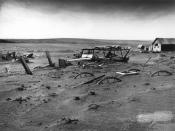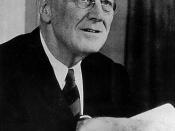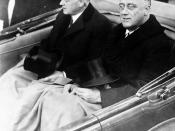In 1929, 71% of Americans earned less than the minimum needed to live decently. Some people had no jobs. African Americans had high jobless rates. Over the years, customer spending and investment dropped. This caused a rising level in unemployment as failing companies fired workers. By 1933, 13-15 million Americans were jobless, with almost half of the country's banks closed.
World War I left the economy in a depression. America entered the war in debt. There was very little growth in the 20's. The world's economy collapsed with the beginning of the Depression. Unemployment caused "unrest." When America entered into WWII, and finally decided to no longer be neutral, America started to come out of the slump. They were forced to buy and produce war materials. This brought the United States out of the Depression. It created many jobs.
The Great Depression affected millions around the world. Many European countries borrowed money from United States banks to rebuild after the First World War.
When the United States economy failed, so did Europe. The hard times spread all over the world until the beginning of WWII.
After Hoover let go of the government relief, states received some federal money to help the poor. In 1932, Hoover assembled an agency to lend money to states, cities, and towns for public works projects. Money was given to these places to build public resources, like dams and roads. Although these projects created jobs, Hoover's actions were too little and too late.
Roosevelt boosted public confidence with three steps, first, with bank holiday. He temporarily shut down all banks. He then promised only to reopen those in good shape. Then, the day before the reopening of banks, he gave his first of many, fireside chats.
The Dust Bowl lasted several years. Winds picked up dirt...


